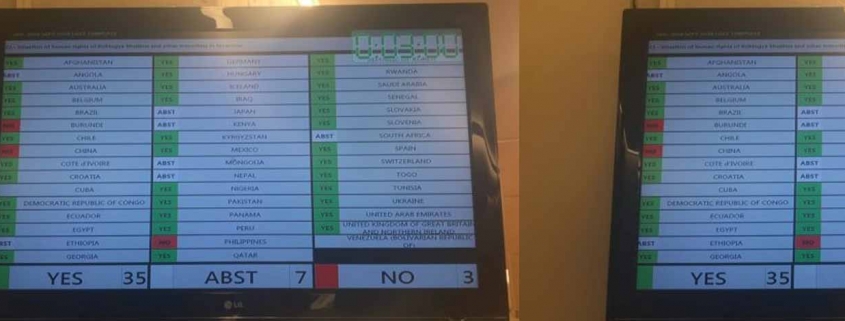Human Rights Council just adopted a resolution on #Myanmar #Burma
Human Rights Council just adopted a resolution on #Myanmar #Burma
Please see below some information prepared by our regional network Forum Asia on the
significance of this resolution:
• This is the first time the HRC has created an international justice mechanism to collect, preserve and document evidence of mass atrocity crimes and prepare files for prosecution. Although this was done previously by the GA on Syria it’s an important precedent for the HRC to create this and it raises the bar high for other human rights situations under its scrutiny.
• In creating this mechanism (and previously commissioning the Fact-Finding Mission) the Council has proved to be the only UN body that has shown any effective response on justice and accountability in Myanmar while the UNSC remains deadlocked and the GA has not been able to go beyond appointing a Special Envoy.
• The resolution brings together two parallel initiatives on Myanmar by the EU and the OIC at the HRC and its joint authorship by the two blocs is significant in bringing consensus amongst 84 UN member states on the need for justice and accountability in Myanmar.
Significance of the mechanism the resolution creates:
• The mechanism (like IIIM Syria) adds a new layer to options available to deal with justice for mass atrocity crimes. Previously the most UN bodies outside the Security Council could do was to conduct an independent investigation through bodies such as a CoI or a fact finding mission. All options beyond this were left to the Security Council which has been unable to act and deadlocked due to the unwillingness of one or more of the P5.
• The preservation of evidence function of the mechanism is important. International justice processes have often been a long wait and the passage of time affects available evidence. In the case of Myanmar for instance there have been reports indicating that the government has been razing or bulldozing and actively covering up sites where atrocities were said to have been committed. Refugees live in Bangladesh under harsh crowded conditions in a difficult environment susceptible to floods, epidemics and other calamities. Many objects of evidence may not survive such conditions for long. Multiple initiatives to document violations may led to victims being interviewed on the same topic a number of times affecting the freshness of testimonies and inviting trauma. Evidence collected through private initiatives may not always meet legal standards or stand up in court. An early initiative by the UN to collect and document evidence to legal standards will go a long way in facilitating effective trials if a judicial mechanism is set up on Myanmar in the future.
For full information, please find on Forum Asia website.



